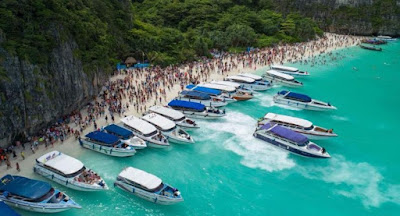THE WORST haze crisis in 17 years hit Songkhla’s Hat Yai district hard
yesterday, with the amount of PM10 particles far exceeding the safe
level.
As of yesterday, the amount of particulate matter (PM) of up to 10
microns in size (PM10) reached 369.0 micrograms per cubic metre of air
in Hat Yai, the economic hub of Thailand's South.
People are considered safe only when the PM10 does not rise above 120 micrograms.
In 1998, the PM10 in Songkhla skyrocketed to 459.5 micrograms per cubic
metre of air. Locals had hoped that such a seriously hazy situation
would never recur.
But yesterday, although the PM10 did not yet beat the previous record,
air pollutants were clearly visible in Hat Yai, even to the naked eye.
The problem is widely blamed on Indonesia's forest fires.
Officials in Songkhla province were busy handing out facial masks to help locals cope with the health impacts.
Government Spokesman Maj-General Sansern Kaewkamnerd said Prime Minister General Prayut Chan-ocha had already instructed family-medicine teams to visit affected people.
"People need to get proper healthcare," he said, "They also need to get
advice. For example, they should avoid staying outdoors with the haze
raging on. If they develop tightness in the chest or have difficulty
breathing, they should immediately seek medical help".
According to Sansern, the prime minister is very concerned about the
haze, which has blanketed Thailand's South. All relevant authorities are
now ordered to closely monitor the situation and extend help to people.
"Local administrative bodies, on their part, can help ease the
pollution by spraying water in the air," the government spokesman said.
Sansern said the government has already contacted Indonesia about the
haze, and Indonesia said it was sorry about the pollution caused.
Yesterday, haze was also a major problem in at least five other
southern provinces: Satun struggled with a PM10 of 276 micrograms;
Pattani with PM10 211 micrograms; Surat Thani with PM10 of 187
micrograms; Yala with PM10 of 172 micrograms; and Narathiwat with PM10
of 123 micrograms.
As haze significantly reduced visibility, flight services to and from Thailand's South have been affected.
Executives of schools in Songkhla are now allowed to decide whether
temporary closure is necessary should the PM10 rise above 350
micrograms.
So far, Songkhla has not been declared a disaster-hit zone as
authorities are worried that such a declaration may affect local
tourism.
Halem J Marigan, director of the Regional Environmental Office 16
(Songkhla), yesterday evening said there were signs of improvement.
"The average PM10 amount during the past 24 hours has finally reduced.
It dropped from 369 to 365 micrograms per cubic metre of air if we
concluded the measurement at 4pm Thursday," he said.
He believed stronger winds had benefited Thailand, as the haze was pushed away faster.
In Surat Thani, several flights to Samui Airport were delayed yesterday because of the haze.
"Many flights could not land in the morning. They had to wait until the
afternoon," said Surat Thani Governor Wongsiri Promchana.
He said he had also advised locals to turn on the headlights of their vehicles when driving in hazy areas.
Wongsiri said all tourist attractions were still open as normal as of now.
Flight services in the southern provinces of Trang and Krabi are also affected.
In Trang, locals yesterday urged relevant authorities to help tackle the haze problem that had recurred every now and then.
"It has affected us adversely. I feel uncomfortable because the haze
has made it hard for me to breathe," Areerat Boonprasert, 52, said.
.






























